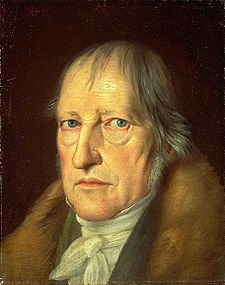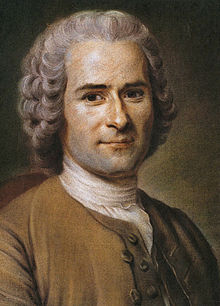An Overview of the Apologetics of Francis Schaeffer (Part 2)
Francis Schaeffer

Thomas Aquinas

Immanuel Kant

Friedrich Hegel

Jean-Jacques Rousseau

Soren Kierkegaard

John Cage, Composer

Leading Figures
According to Schaeffer, Thomas Aquinas began the historical process of the division of knowledge. Aquinas believed that the will of human beings was fallen, but that their intellect was not. The intellect, therefore, became autonomous in areas of natural theology and philosophical reasoning. As the result of the intellect’s autonomy, a dichotomy arose in Europe between “nature and grace.” “Grace” consists of the higher things: God the Creator; heaven and heavenly things; the unseen and its influence on the earth; and man’s soul; unity. Nature encompasses the lower things: the created; earth and earthly things; the visible and what nature and man do on the earth; man’s body; diversity. Because the intellect was autonomous in the area of nature, nature began to eat up grace. In other words, nature began to overwhelm the heavenly. For example, in earlier times the Madonna was once iconographical; in Renaissance times, she took on the likeness of well-known mistresses. The natural became more prominent than the religious, and dominated mankind’s perspective.
This process also took place in science. Jean-Jacques Rousseau changed the formula from grace and nature to freedom and nature to avoid being trapped by either nature or society as the machine. Nature, to him, was totally autonomous; determinism emerged.
Immanuel Kant saw the incompatibility of human freedom with determinism, and recognized the tension which existed between them. He could not bring the noumenal (Schaeffer’s grace) and the phenomenal (Schaeffer’s nature) together. A dichotomy exists between the physical particulars of the universe wherein there is no special significance or meaning for a mankind that is just one among other physical entities, and a nonphysical realm of existence wherein significance, meaning, and values can be found for mankind.
Friedrich Hegel developed the synthetic movement, which postulated that the answer lies in a synthesis between the thesis and the antithesis. Schaeffer called this movement “the door into the line of despair.” He asserts that sometime between 1880 and 1930 rationalistic philosophers “despaired” of finding a unified answer to life on the basis of antithetical reasoning, and resorted to Hegelian synthesis.
Soren Kierkegaard is the first thinker to go below "the line of despair." He could not arrive at a synthesis by reason, so he achieved it by a non-rational “leap of faith.” He separated the rational and logical from faith. For him, the rational dealt with the physical aspects of existence, and the logical handled the ideas of significance, meaning, and values. If one were to picture this relationship in a diagram, one would put the non-rational and non-logical in the “upper story” realm of the existential experience, the final experience, and the first-order experience. The “line of despair” would separate this realm from the rational and logical in the “lower story” realm where only particulars exist, but no purpose or meaning. Here, mankind is only a machine.
The non-rational leap manifested itself in the drug culture, modern art, music, general culture (literature, drama, cinema, mass media), and theology. Aldous Huxley, the author of Brave New World, suggested that a way of achieving a “first-order experience” would be through drugs. Timothy Leary experimented with LSD in order to attain to an irrational experience to make some sense of life. In the world of art, Pablo Picasso tried to paint a universal woman, and abstracted so wildly that one could not tell what one was looking at. He lost the ability to communicate and became alienated. The composer John Cage, believing that there is only an impersonal universe speaking through blind chance, tossed coins into the air for the length of his piece. Later, he devised a mechanical conductor with no set motions; on another occasion, he set two conductors against each other, one unable to see the other, but both conducting simultaneously. In theology, the “God is Dead” movement maintained not that people today are not listening to God very much in our secular world, but that God never was there for people to listen to.
Schaeffer sees two epistemological difficulties attending the non-logical movement toward meaning. First, existential experiences are, by nature, non-communicative. This characteristic creates isolation, alienation, the unknowability of others, and the problem of knowing others. Second, it also creates the problem of knowing with others. No intersubjective basis for common knowledge exists, and no direction to act on problem solving. In none of these views can universality (meaning) logically relate to particularity (items in one’s world of experience).

Meaning of Epistemology
view quiz statisticsSchaeffer's Epistemological Argument
Now Schaeffer moves on to the epistemological argument. Epistemology, you will recall, is the branch of philosophy that is concerned with the theory of knowledge: its nature, limits and validity. Schaeffer posits that a presuppositional shift from an open system to a closed system took place in modern science. Modern science began with a belief that God created the universe, and that He made mankind so that he could discover the form of His creation by means of reason. As we pointed out earlier, this belief is known as the uniformity of natural causes in an open system. God made everything so that mankind was free from the determinism of a closed “machine.” In the eighteenth and nineteenth centuries, mankind excluded God from the picture, the presuppositional shift occurred, and the uniformity of natural causes in a closed system assumed the preeminence.
The philosophical movement known as positivism developed during this time; it represents, according to Schaeffer, a modern attempt to establish epistemological certitude. Schaeffer rejects positivism’s position in three ways. First, he contends that it does not consider the knower of what is known, or it does not take into account the knower’s presuppositions. In other words, it does not hold that people are subjective creatures, but believes that human beings are completely objective. Second, Schaeffer argues that positivism cannot provide its own first move; it cannot guarantee that there is any difference in its first move between “reality and fantasy.” In other words, it cannot say that anything exists at all. Third, he maintains that positivism offers no guarantee that there is a correlation between the thought of the observer and the thing observed. Positivism does not have the epistemological answers. Later, we will examine Christian epistemology to learn why it is a better system.
First, however, let’s take a look at the three philosophical principles that the Western schools of philosophy shared and the historical process of division among the areas of knowledge. Schaeffer considered the chief problem of the twentieth-century intellectual and cultural climate to be the separation of the attainment of knowledge in the areas of human significance, meaning, and personal hope from the attainment of knowledge in every other area, creating a “divided field of knowledge.” Throughout Western history, the philosophy schools have shared three principles: (1) an adherence to rationalism, (2) a belief in the rational, and (3) a hope that a unified field of knowledge might be constructed.
Let’s look at rationalism first. Schaeffer offers three definitions of rationalism, or human epistemological autonomy, which individually provides insight into its full meaning: (1) It believes that mankind, beginning absolutely and totally from himself, gathers the information concerning the particulars, and formulates the universals; (2) It is a philosophical orientation which does not recognize the epistemological primacy or even the validity of an alleged divine revelation to mankind; and (3) It is any philosophy or system of thought that begins with man alone, in order to try to find a unified meaning to life. Modern human beings held to a rationalistic basis; they turned from the Holy Scriptures and turned toward discovering the answers by their own efforts.
Second, the philosophy schools all believed in the rational. They acted upon the basis that mankind’s aspirations for the validity of reason were well-founded. They also thought in terms of antithesis; that is, if something is true, its opposite is false. Through an application of their reasoning faculty, the schools thought that they could find a unified answer to life’s existential questions.
Third, the philosophers believed that rationalism plus rationality would issue a complete answer to all of thought and all of life. Along the way, however, these gentlemen despaired of finding such a “unified rationalistic circle.” Therefore, leaving the methodology of antithesis, they shifted the concept of truth.
What Christianity Possesses
view quiz statisticsThe Christian Answer
Now, let’s take a look at the Christian answer. According to Schaeffer, Christianity provides the epistemological answers. That is, it tells us how we know that we know. In Schaeffer’s upper story—the realm of grace, if you will—we find God and His decrees: His eternal purpose, according to counsel of His will, whereby for His own glory He has foreordained whatsoever comes to pass, and in the lower story—the area of nature—we find created particularity: mankind, which is significantly free and significantly responsible. What Christianity possesses is an ultimate epistemological guarantee or Guarantor, which ensures that mankind can really know what they think they know, thus providing a basis for knowledge. The design of the universe in regard to knowers and objects of knowledge leads us to important conclusions. If no epistemological guarantee exists, human beings are pulled toward skepticism and alienation to their environment. However, everyone acts as if there were a guarantee. The skeptic has knowledge enough of things to express his views, and the success of human activity requires prior success of human knowledge. A closed system cannot explain this phenomenon. Schaeffer sets forth his set of Christian presuppositions as a specific type of open system which explains the data and answers the problems.
Schaeffer says that Christianity has no problem of epistemology, and points to divine revelation as the reason. God spoke about two areas: Himself, truly, and history and the cosmos, truly, in propositional verbalization. Unity exists. Christian epistemology provides for reality in its first move. We know that the thing is there because God made it to be there. We have a correlation of the categories of our minds to fit what is there. God made the universe with things together in relationships. We can really know other people because we are all made in the image of God. This image—the “mannishness of man,” which involves human attributes and aspirations— is the available source for knowledge of the deepest truths about any human being.
Finally, Schaeffer discusses the third part of his “argument from design”: the moral argument. In this section he compares the two basic presuppositions regarding the universe: the impersonal (closed system) and the personal (open system). The making of moral distinctions—Schaeffer calls them “moral motions”—is part of human personality (mannishness, aspirations). Human beings cannot fulfill these aspirations in an impersonal universe, but that fact does not make it impossible to maintain an impersonal beginning. There are three standards of operating “moral motions” in a universe without moral absolutes: (1) hedonism; (2) sociological law; and (3) totalitarianism. All three of these standards are humanly manufactured sets of moral absolutes. Hedonism works when one man is involved; place more than one man into the mix, and there is chaos. Sociological law—the “dictatorship of fifty-one percent”—leads to the condition that states, in essence, that anything could be allowed as right or just. Totalitarianism purports arbitrary absolutes; this arrangement leaves one with the likelihood of undesirable, unrestrained results. Therefore, all three standards fail to provide an adequate answer.
When Schaeffer turns to the personal beginning, he asks the question, “If we begin with a personal beginning, how do we explain the dilemma of man’s cruelty?” First, we can say that man has always been intrinsically cruel. If man was created by an infinite-personal God, we cannot escape the fact that God is cruel. A certain witticism—“If there is a God, He is the Devil—would then be the unavoidable conclusion. Liberal theologians are faced with this problem because they reject the Fall. Nevertheless, they sidestep the implications of this belief by “a step in faith against all reason.” Second, if human beings have always been intrinsically evil, then there can never be any hope of a qualitative change in them. He will continue to be what he has always been.
However, if human beings as they are now are not what they were, if they are now by their own choice abnormal, and are not what they intrinsically were in the beginning, then there’s an explanation for why they are cruel which does not impugn the moral nature of God. That explanation, of course, is the space-time Fall. Since human beings are now abnormal, there is a hope of restoration to normality through the grace of the Lord Jesus Christ. Humanity has a basis for fighting social evil without the problem of fighting God.
So then, what has this overview of Francis Schaeffer’s apologetic shown? First, it has shown that Schaeffer argues that a personal beginning gives the best answer to the question of metaphysics or existence. Second, this overview has demonstrated that his methodology points out that what Christianity possesses—divine revelation—is the ultimate epistemological guarantee or Guarantor, which ensures that mankind can really know what they think they know, thus providing a basis for knowledge. And third, our overview of Schaeffer has revealed that, for Schaeffer, the space-time Fall provides the answer for why mankind is cruel now, and that the person of Jesus Christ and His finished work on the cross offers human beings the hope of being restored to their original nobility.
© 2015 glynch1








